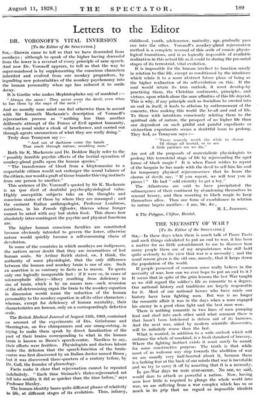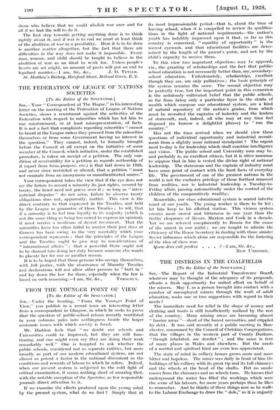THE NECESSITY OF WAR ? [To the Editor of the
SPECTATOR.]
SIR,—In these days when there is much talk of Peace Pacts and such things calculated to put an end to war, it has been a matter for no little astonishment to me to discover how many people there are of my acquaintance who still hold quite seriously to the view that war is a necessity ; and the usual reason given is the old one, namely, that it keeps down the population of the world.
If people possessed of common sense really believe in the necessity of war, how can we ever hope to put an end to it ? It seems that in spite of the grim lessons the last War taught us we still regard the soldier's life as romantic to a degree. Our national history and traditions are largely responsible for it. Most of our national heroes who have made our history have been fighting men. But war is no longer the romantic affair it was in the days when a man engaged his enemy in a good clean fight and the best man won.
There is nothing romantic in two lines of men pumping lead and steel into each other until what remnant there is that hasn't been butchered is driven out of its burrows. And the next war, aided by modern scientific discoveries, will be infinitely worse than the last. What is wanted, in addition to a wide outlook which will embrace the whole of mankind, is a fresh standard of bravery. Where the fighting instinct exists it must surely be meant for some constructive purpose. The truth is that while most of us welcome any step towards the abolition of war we are usually very half-hearted about it, because there is a lurking fear at the back of our minds that war is inevitable and we try to carry it off by asserting that it is a necessity.
In pre-War days we were over-secure. No one, we said, would dare to attack so powerful a nation. Now, having seen how little is required to plunge the whole world into war, we are suffering from a war complex which has us so much in its grip that we regard as impossible idealists
those who believe that we could abolish war once and for all if we had the will to do it.
The first step towards getting anything done is to think rightly about it, and if war is to end we must at least think of the abolition of war as a possibility. How it is to be done is another matter altogether, but the fact that there are difficulties in the way does not make it impossible. Every man, woman, and child should be taught to believe in the abolition of war as an ideal to work for. Unless people's hearts are set aright, no amount of pacts will put an end to





























 Previous page
Previous page